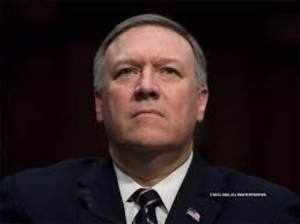 Agencies
AgenciesWashington: The Trump administration on Wednesday stepped up its battle with China by further restricting the ability of Chinese diplomats to travel, hold meetings with academics and host cultural events in the United States. Secretary of State Mike Pompeo announced that senior US-based Chinese diplomats will now be required to get permission to visit American universities or meet with local government officials.
Previously, under rules announced last fall, Chinese officials had been required only to notify the State Department of plans for such meetings.
Pompeo also said that Chinese diplomats will have now to get permission to host cultural events of more than 50 people outside of their diplomatic missions.
In addition, he said the State Department would act to ensure that the social media accounts of Chinese officials be identified as belonging to the People's Republic of China and the Chinese Communist Party.
"The United States insists on reciprocal access to educational and cultural institutions for U.S. diplomats around the world," Pompeo said.
"These new requirements on PRC diplomats are a direct response to the excessive restraints already placed on our diplomats by the PRC, and they aim to provide further transparency on the practices of the PRC government. Should the PRC eliminate the restrictions imposed on U.S. diplomats, we stand ready to reciprocate."
The moves come as the administration ramps up actions against Chinese officials in a widening effort to counter what it says is unfair treatment of American diplomats in China.
And they come as relations between the two countries continue to plummet amid a numerous disputes over trade, Taiwan, Tibet, human rights, Hong Kong and the coronavirus pandemic.
Trump has blamed China for failing to adequately respond to the COVID-19 outbreak, which began in the Chinese city of Wuhan.
The United States has had the most deaths in the world and Trump's Democratic rival, Joe Biden, has blamed Trump for the rapid spread of the virus in the United States, which surged after Trump pushed for a lifting of restrictions. Trump, meanwhile, has accused Biden, of being soft on China.
Despite Trump's previous affinity for Chinese President Xi Jinping, his administration has since last year consistently ratcheted up restrictions and sanctions on Chinese officials, government agencies and companies, beginning with travel limits imposed on diplomats and registration requirements for Chinese media outlets. The number of visas for Chinese journalists was also cut.
In June, the US ordered China to close its consulate in Houston, Texas, which drew a reciprocal response from Beijing that forced the closure of the US consulate in Chengdu. Last month, the administration demanded that Chinese-funded language and culture programs in the US register as foreign missions of the Chinese Communist Party.
Previously, under rules announced last fall, Chinese officials had been required only to notify the State Department of plans for such meetings.
Pompeo also said that Chinese diplomats will have now to get permission to host cultural events of more than 50 people outside of their diplomatic missions.
In addition, he said the State Department would act to ensure that the social media accounts of Chinese officials be identified as belonging to the People's Republic of China and the Chinese Communist Party.
"The United States insists on reciprocal access to educational and cultural institutions for U.S. diplomats around the world," Pompeo said.
"These new requirements on PRC diplomats are a direct response to the excessive restraints already placed on our diplomats by the PRC, and they aim to provide further transparency on the practices of the PRC government. Should the PRC eliminate the restrictions imposed on U.S. diplomats, we stand ready to reciprocate."
The moves come as the administration ramps up actions against Chinese officials in a widening effort to counter what it says is unfair treatment of American diplomats in China.
And they come as relations between the two countries continue to plummet amid a numerous disputes over trade, Taiwan, Tibet, human rights, Hong Kong and the coronavirus pandemic.
Trump has blamed China for failing to adequately respond to the COVID-19 outbreak, which began in the Chinese city of Wuhan.
The United States has had the most deaths in the world and Trump's Democratic rival, Joe Biden, has blamed Trump for the rapid spread of the virus in the United States, which surged after Trump pushed for a lifting of restrictions. Trump, meanwhile, has accused Biden, of being soft on China.
Despite Trump's previous affinity for Chinese President Xi Jinping, his administration has since last year consistently ratcheted up restrictions and sanctions on Chinese officials, government agencies and companies, beginning with travel limits imposed on diplomats and registration requirements for Chinese media outlets. The number of visas for Chinese journalists was also cut.
In June, the US ordered China to close its consulate in Houston, Texas, which drew a reciprocal response from Beijing that forced the closure of the US consulate in Chengdu. Last month, the administration demanded that Chinese-funded language and culture programs in the US register as foreign missions of the Chinese Communist Party.
(Catch all the Business News, Breaking News, Budget 2024 News, Budget 2024 Live Coverage, Events and Latest News Updates on The Economic Times.)
...moreDownload The Economic Times News App to get Daily Market Updates & Live Business News.
Subscribe to The Economic Times Prime and read the ET ePaper online.
Read More News on
(Catch all the Business News, Breaking News, Budget 2024 News, Budget 2024 Live Coverage, Events and Latest News Updates on The Economic Times.)
...moreDownload The Economic Times News App to get Daily Market Updates & Live Business News.
Subscribe to The Economic Times Prime and read the ET ePaper online.





